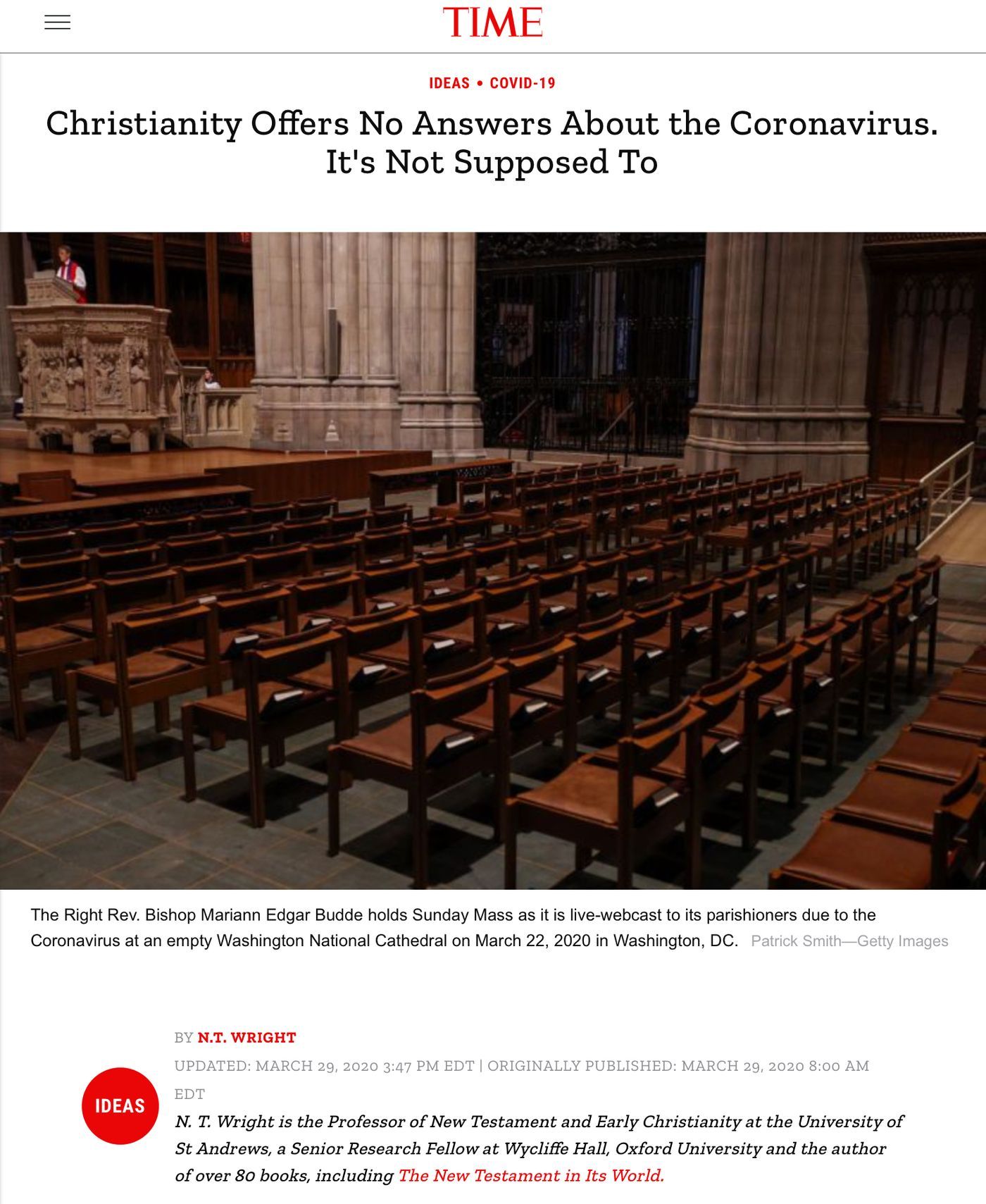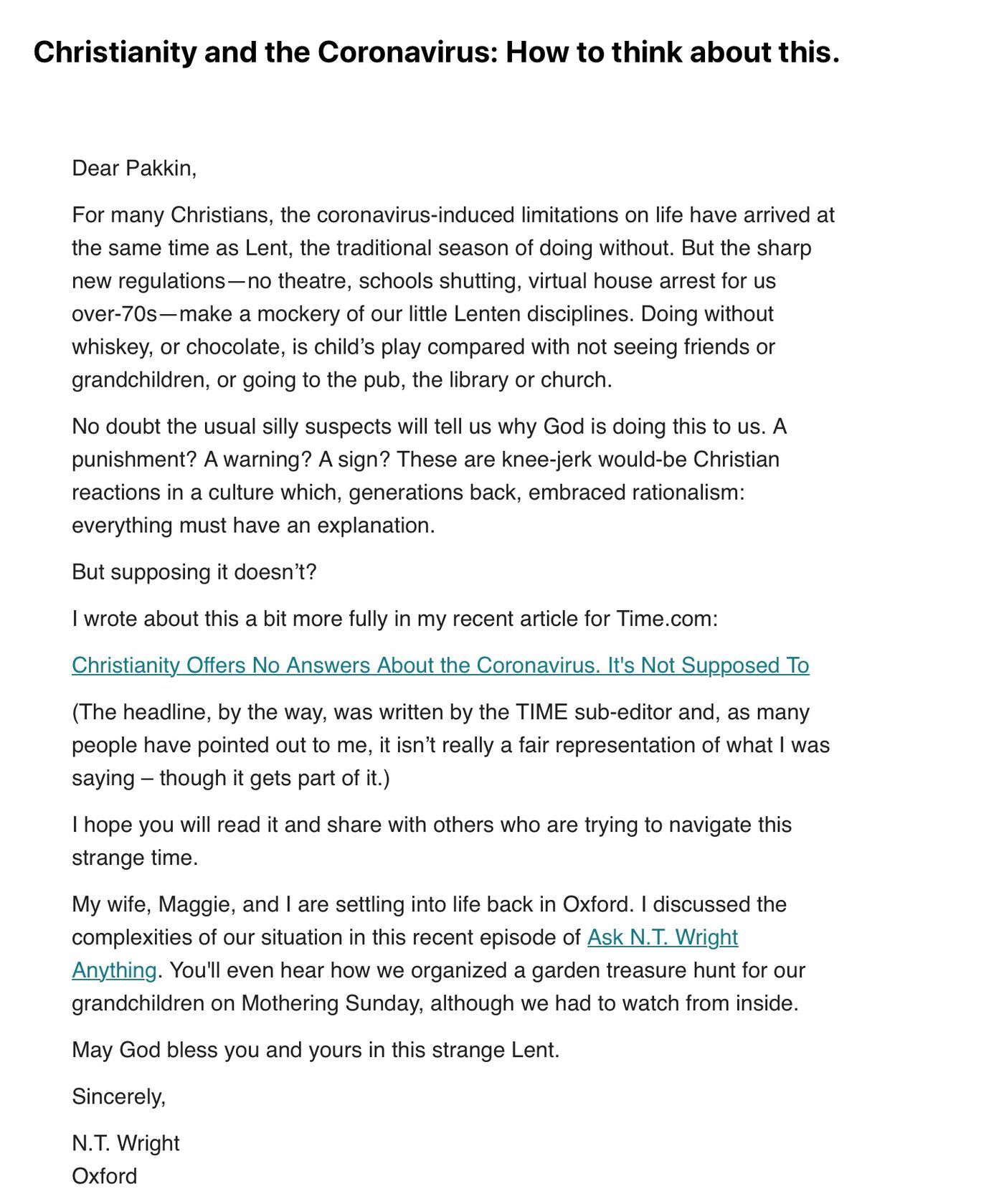
《突破書誌 Breakazine》前總編輯,dot-com-fever時代做過網,不出席網友活動的自閉blogger。入行做編輯時,仍是用rubber cement貼稿的年代。歷任書籍編輯、網站監製、雜誌編輯等職務。2019年出版了第一本個人著作《時勢好惡,做基督徒好難》。愛看書,愛攝影,愛動漫。
爆漿賴特牛丸──略談N.T.Wright在Time關於疫情的文章
這幾天我在社交媒體,貼了一些文章,討論到COVID-19下,基督教信仰有什麼觀點,可以幫助我們面對苦難的處境。
其中一篇文章,作者為著名的新約聖經學者賴特(N.T. Wright),擁躉/粉絲眾多,但也有不少人對他的觀點頗有意見。較為保守的教會不滿他把保羅新觀(The New Perspective on Paul)推廣得街知巷聞,而按我理解,所謂新觀,某程度是把使徒保羅重新安放在第一世紀猶太信仰群體的脈絡去理解,而非按十六世紀宗教改革的視點來詮釋使徒保羅的書信著作。另外也有些人會覺得,他向大眾演繹基督教信仰時,信手拈來的文化、學術例子,過於簡化,有點抽水、討便宜的味道,對被批評的對象不太公允。
這次他在Time刊出的文章"Christianity Offers No Answers About the Coronavirus. It's Not Supposed To",大概是踏中了第二個雷區。

雖然同鄉梁公文道說不喜歡利申,不過我都先利申一下、戴個頭盔:我有讀賴特的書,中譯本為實體印刷版,英文原著則在Amazon買Kindle版,某程度上都幾對口胃,覺得他是很懂得把說話和學說包裝得十分吸引的作者,但我沒有研究他,而且他的著作超多,不斷有新著,怎也讀不完,對他的理解可能只是一知半解。
賴特那篇文章引起的批評,除了標題令人眉頭一皺之外,主要應該來自這段:
//No doubt the usual silly suspects will tell us why God is doing this to us. A punishment? A warning? A sign? These are knee-jerk would-be Christian reactions in a culture which, generations back, embraced rationalism: everything must have an explanation. But supposing it doesn’t? Supposing real human wisdom doesn’t mean being able to string together some dodgy speculations and say, “So that’s all right then?” What if, after all, there are moments such as T. S. Eliot recognized in the early 1940s, when the only advice is to wait without hope, because we’d be hoping for the wrong thing?//
講完這段,他立即就轉向講哀歌(lament)傳統。
At this point the Psalms, the Bible’s own hymnbook, come back into their own, just when some churches seem to have given them up. “Be gracious to me, Lord,” prays the sixth Psalm, “for I am languishing; O Lord, heal me, for my bones are shaking with terror.” “Why do you stand far off, O Lord?” asks the 10th Psalm plaintively. “Why do you hide yourself in time of trouble?” And so it goes on: “How long, O Lord? Will you forget me for ever?” (Psalm 13). And, all the more terrifying because Jesus himself quoted it in his agony on the cross, “My God, my God, why have you forsaken me?” (Psalm 22).
Yes, these poems often come out into the light by the end, with a fresh sense of God’s presence and hope, not to explain the trouble but to provide reassurance within it. But sometimes they go the other way. Psalm 89 starts off by celebrating God’s goodness and promises, and then suddenly switches and declares that it’s all gone horribly wrong. And Psalm 88 starts in misery and ends in darkness: “You have caused friend and neighbor to shun me; my companions are in darkness.” A word for our self-isolated times.
以文章論,我想這個立論位是有點跳得太快。
如果按這脈絡理解,他大概只是想說,如果什麼也要有即時答案,就會穿鑿附會,硬要為苦難找quick fix。這個當然很同意。但他用了理性主義、浪漫主義來隨手批評兩句,這就會扣連到太多細節和演化的傳統;留了這個尾巴,就需要很大篇幅去處理。但對Time這種以大眾為讀者對象、篇幅有限的文章來說,這寫法並不合適。
對期望從教會傳統尋求應對的人來說,設下哀歌這指路牌,也是可以的了。至於能否回應到所有信徒的理性困擾,那還是需要再作思考。再者,不要立時用quick fix答案去看諸如疫情這災難,就是要留下尋問和沉澱的空間,重新認識世界的苦難、人的有限和罪性、上帝的性情和拯救,在靈性上和知性上都是有需要的。

最後提一提,賴特在N.T. Wright Online的newsletter提到,上述文章的標題是Time編輯(sub-editor)改的。是的,確是有點標題黨的味道。這種編輯為了吸引人讀文(無人click入來讀,寫得多好都無意思),和作者覺得被扭曲原意、重點錯置之間的張力,也是我們從事雜誌編輯工作的人,長久以來的夢魘。
Pakkin
P.S.: 關於不同意賴特對理性主義的批評,可以參看張國棟:〈反思基督徒回應苦難的進路,回應 N.T. Wright〉,文章從宗教哲學入手,嘗試疏理理性主義傳統的發展,指出未必像賴特說得那麼不思悔改。
喜欢我的文章吗?
别忘了给点支持与赞赏,让我知道创作的路上有你陪伴。
发布评论…